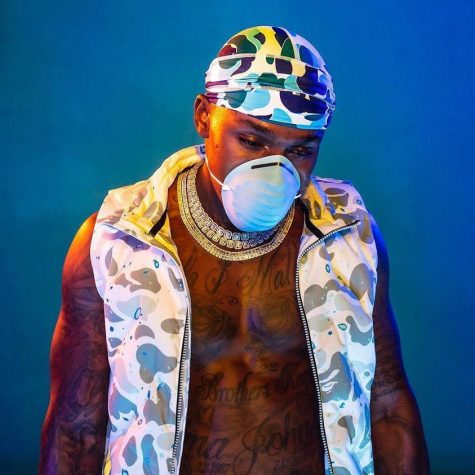“El Camino” Is A Nostalgic Joyride Through “Breaking Bad”
“El Camino,” recently released on Netflix, continues the story of character Jesse Pinkman from “Breaking Bad.” (Courtesy of Twitter)
October 16, 2019
With the recent trend of disappointing endings, “Breaking Bad” seems even more exceptional.
Even in the so-called modern “Golden Age of Television,” the saga of Walter White, the terminally-ill chemistry teacher turned drug lord, still holds a special place in our hearts.
I’d say that has quite a bit to do with the series’ satisfying ending. Walter White’s story came to an end in 2013, and his world of drug lab RVs, booby traps and murderous partners went with him. Shows of a similar caliber, from “Dexter” to “Games of Thrones,” couldn’t quite manage to do the same.
With the artful conclusion of “Breaking Bad,” it’s easy to imagine that the sequel, “El Camino,” is an unwelcome continuation. The Netflix exclusive film doesn’t quite recapture the magic of the original series, but it’s still a worthy addition.
Taking place hours after the series finale, “El Camino” reveals the fate of Walter’s foul-mouthed partner Jesse Pinkman (Aaron Paul). In some ways, his character had already had the perfect ending. Driving off to an uncertain freedom felt like a natural endpoint for the character. “El Camino” expands that without overwriting anything.
Jesse’s current state is immediately established as very fragile, even with his captors dead and gone. The film follows his attempts to stay ahead of the authorities and former “associates,” while using flashbacks to fill in the gaps.
In most ways, “El Camino” is two “Breaking Bad” episodes welded together. It’s assumed that you’ve already seen the whole series, a sentiment reinforced by a vague recap segment. “El Camino” manages to replicate the tone, pacing and other elements of the series with some measure of success.
The bizarre dark comedy elements that disappeared from the show somewhere around season five make a return. That’s offset by Jesse’s struggle with the trauma of losing everyone he cared about and being kept prisoner for so long.
This is all fairly well done, but it feels a lot more linear and restrained than what came before it. “El Camino” still falls a bit short of the show’s heights, but it gets enough right to maintain interest.
The one place “El Camino” completely matches or exceeds “Breaking Bad” is the camerawork and visuals. The clever point-of-view shots make a return, along with some more interesting tricks. Jesse tearing up Todd’s (Jesse Plemons) apartment in search of his money almost feels like a music video with the unorthodox way it was filmed.
It lends intensity to an otherwise dull scene and, in some way, acknowledges the more surreal aspects of Jesse’s situation.
The set design and costuming is also top notch and does as much to tell the story as the actors and camerawork. “El Camino” might not have entirely succeeded in capturing the soul of “Breaking Bad,” but it at least got the presentation down.
As enjoyable as it may be, “El Camino” constantly needs to justify its own existence. The decision to set it so close to the ending of “Breaking Bad” was bold and helps avoid some difficult questions. By the same merit, it forced me to compare “El Camino” to the extremely memorable climax of the series. I think I might have enjoyed the film more if it weren’t so intertwined with the strongest episodes of “Breaking Bad.” The attempts to connect “El Camino” to older episodes through flashbacks don’t entirely mitigate that.
Tying “El Camino” so closely to “Breaking Bad” also draws attention to how much older every actor is. By extension, it’s a reminder of how long it’s been since this show ended. Aaron Paul’s facial hair and scar makeup help him avoid scrutiny, but Jesse Plemons has no such luck.
Thankfully, his nuanced performance as an awkward, unassuming but utterly hateable antagonist is so good that it becomes easy to suspend your disbelief.
Just as Plemons ends up stealing the spotlight and downplaying obvious issues, “El Camino” pulls off a similar trick. The film identifies what made the world of “Breaking Bad” so compelling in the first place and uses it to distract from its flaws.
The way “El Camino” expands upon the characters is compelling enough to prevent the whole affair from feeling unnecessary. Most importantly, “El Camino” builds on top of Jesse’s already serviceable ending instead of just replacing it.
The film replicates the quieter, unevenly entertaining moments of the series rather than its dramatic heights. But even the weaker parts of a show like “Breaking Bad” are still immensely enjoyable and the same can be said of “El Camino.”










If you want a picture to show with your comment, go get a gravatar.